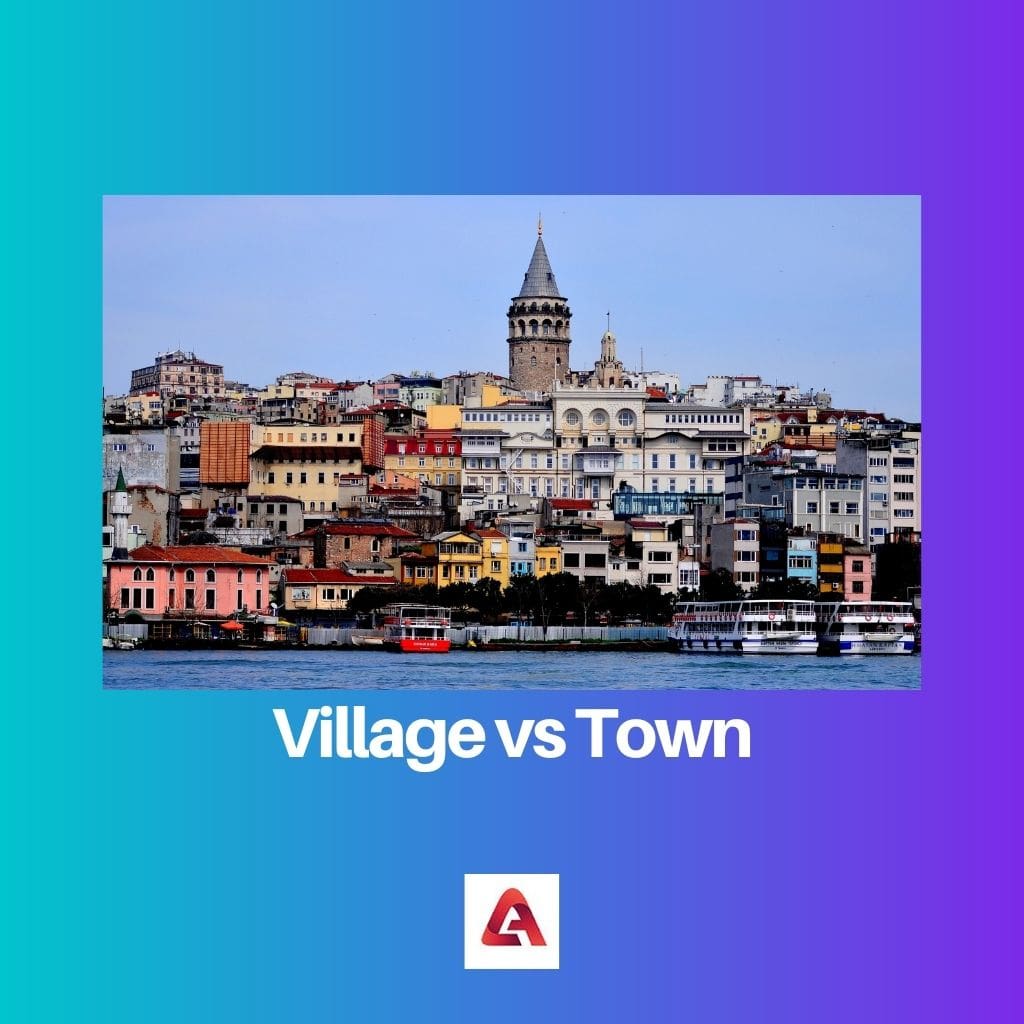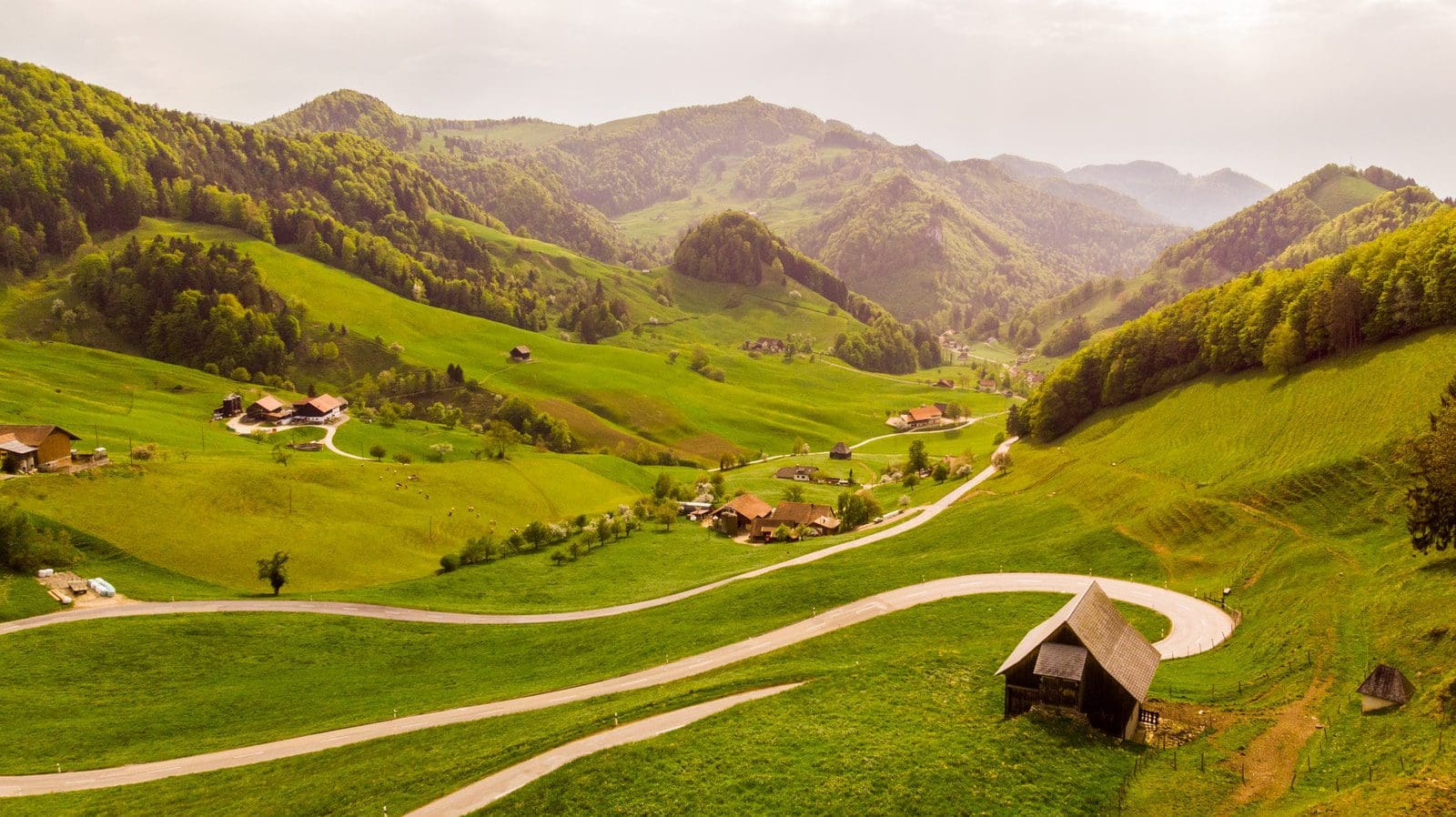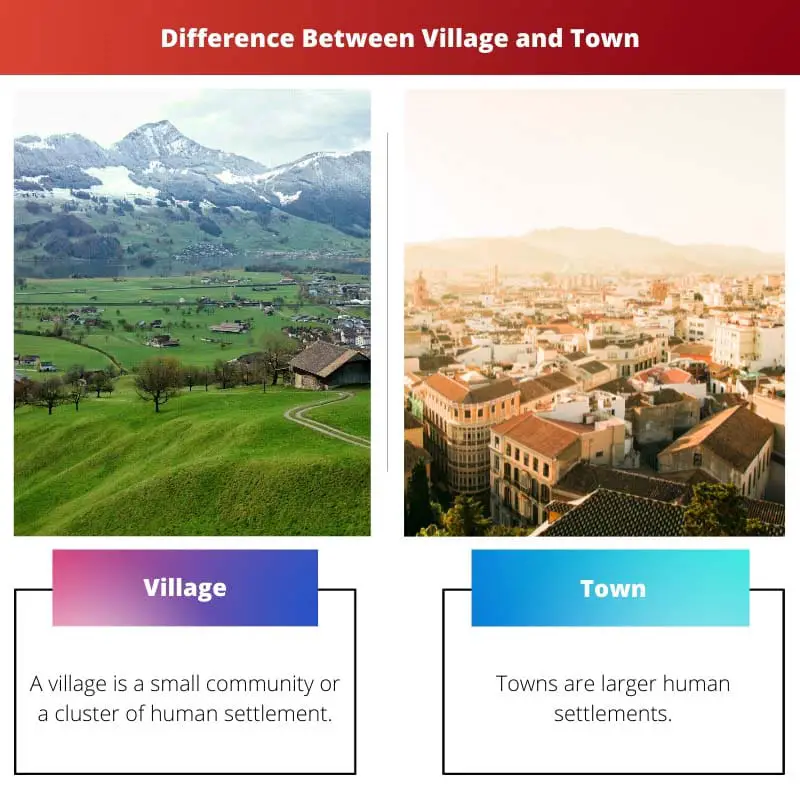Human settlement is a very complex arena. From ancient times until now, it has evolved and expanded beyond conventional background.
There is a lot of confusion regarding what area is what, what it is called, and what its specifications are. Two types of human settlements that are confusing are villages and towns.
Both these terms are used differently worldwide, and they have their specifications according to their community.
Key Takeaways
- Villages are smaller, rural settlements with fewer inhabitants; towns are larger, more developed urban areas with a higher population.
- Villages have limited facilities and services; towns offer a wider variety of resources, such as schools, healthcare, and shopping centres.
- Villages have more agricultural land and open spaces; towns have denser infrastructure and commercial areas.
Village vs Town
Villages are small communities with a close-knit community and limited economic activity, with basic services such as a school, shops, and a religious center. Towns are larger settlements with a more diverse economic base and advanced infrastructure, such as hospitals, shopping centers, and educational institutions.

The villages lack job opportunities, and villagers leave their space and come to town for jobs. Whereas in towns, jobs are found in abundance.
Villages are considerably small human settlements. They have a population of a couple hundred to a couple thousand people. Villages are situated in rural areas.
Towns are a larger area of human settlement. The population of a town is more as it is more urbanized than a village.
Comparison Table
| Parameter of Comparison | Village | Town |
|---|---|---|
| Human Settlement | They are smaller in size | They are larger |
| Recognition | They are a part ofa town or a separate settlement | It is a government-recognized space |
| Specialty | It does not have any separate market | It has a separate market space |
| Authority | It does not have any governing body | Has local government and authority |
| Commercial Exposure | There is no commercial exposure | It has a lot of commercial exposure |
| Revenue | Dependent on agricultural means | Relies on commercial and industrial activity |
| Diversity | It does not have much diversity | It is very diverse |
What is Village?
A village is a small community or a cluster of human settlements located in a rural area. It is larger than a hamlet and smaller than a town.
The term village was derived from a French word that meant a group of buildings. A village’s population ranges from a couple hundred to a couple of thousands.
Villages are permanent dwelling spaces. Mostly located in rural areas, but at a certain time, the term urban village has also been mentioned as referring to a specific urban village.
On rare occasions, temporary villages are also found. In the village, the houses are closely packed each other and not scattered on a larger landscape.
The villagers only earn revenue through agricultural methods and cottage or home-based industries.
Due to the lack of job opportunities in the villages and the industrial revolution, many villagers left their villages. They came to the town or cities in search of jobs.
Villages have different names all over the world, such as “deh” in Afghanistan, “dehat” or “gaaon” in Pakistan, “ayul” in Kazakhstan, “tusen” in China, “kampong” in Brunei and Malaysia,
“kampong” or “desain” in Indonesia, “lang” in Vietnam, “selo” in Bosnia and Herzegovina, Bulgaria, Croatia, North Macedonia, Russia, Siberia, and Ukraine, “commune” in France, “pueblo” in Spain, “dorp” in Netherland.
These are just a few examples of what village is known in each community; the majority have their specifications and classifications to call a community a village.

What is Town?
Towns are larger human settlements. The term town originated from the German word Zaun, the Dutch word tuin, and the Old Norse word tun.
The original term referred to a designated fence or a hedge. The term meant walled and fenced areas such as farms, villages, or courtyards in English. It is larger than a regular village but smaller than the cities.
The criterion of a town varies from community to community around the world.
In certain places, the word town is an alternative for a city or village. Town in certain places is also considered a short term for “township.”
In a town, people are denoted on the manufacturing industry, commercial and public services for their income, not agricultural terms. The population is not a factor of determination for towns.
Local government authorities and administration govern towns.
The town can be further classified under 5 categories based on their age according to Thomas Griffith Taylor, namely- infantile town (no clear zoning),
juvenile town (have developed area of the shop), adolescent town (factories have started to appear), mature town (specific industrial and commercial area using defined residential area).

Main Differences Between Village and Town
- Villages are smaller in size, whereas towns are larger.
- A village is part of a town or a separate settlement in a rural space, but a town is a government-recognized space.
- A village does not have a separate market space. All that is available are locally obtained. Nothing comes from outside the village. In a town, there is a separate marketplace for buying and selling goods nothing is found locally.
- There is no governing body looking after the village. There is no governing authority in a village. A town is governed by local government and authorities.
- There is no commercial exposure available in the village. Everything happens locally, whereas, in a town, many commercial opportunities are found, such as stores, banks, and markets.
- Villages do not provide many jobs. Jobs available in a village are mainly agriculture-based cottage or home industry-based. Villager softens have to leave villages to find suitable and better jobs. Plenty of jobs are available in towns based on commercial and industrial activities.

- http://dsq-sds.org/article/view/576
- https://www.cabdirect.org/cabdirect/abstract/19611800176
- https://books.google.com/books?hl=en&lr=&id=UQvGNKBfCgsC&oi=fnd&pg=PR5&dq=towns&ots=yScGQq1AJQ&sig=mWnYLlb8GT9JQ2VbVeD6QvTNm1Y

Town seems to be a much better option than a village; therefore, I can conclude that one day every village will become a town.
“Better” is a subjective term, Alexa Patel.
I think both villages and towns have their charm, Alexa Patel.
Incredible article, it has all the key points and very illustrative examples about the difference between villages and towns. Rarely see such a well-writen explanation for these concepts.
I do agree, Rachel84. The text is outstanding.
An excellent and humorous comparison between towns and cities, I truly enjoyed it!
I didn’t find it humorous, but it was definitely interesting.
I agree with you Zwood, I also found it humorous.
I found the explanation about the different names for villages around the world particularly interesting.
It’s fascinating indeed, Jyoung.
I agree, the diversity of names is quite intriguing.
I found this post to be very informative and educational. Great work!
I second that, Rosie31. Very educational indeed.
I find the definitions to be obsolete, and the explanation of the origins of the words to be quite distracting. Just get to the point!
I agree, Wilson Scarlett. I got lost in the part about the origins of the words.
I think the origins part is really interesting, Wilson Scarlett.
I disagree with the distinction made between villages and towns. With the development of modern society, these differences are not accurate.
I see your point, Cameron74. Society has evolved so much that these definitions are not really applicable anymore.
I found the point about villages being permanent dwelling spaces to be quite thought-provoking.
I simply didn’t find the comparison table to be useful; I believe the whole point could’ve been better explained.
I agree with you Alan60, the comparison table is a bit confusing.
I actually found the comparison table to be quite helpful.
I did not appreciate the sarcastic tone in some parts of this post. I believe it’s completely unnecessary.
I found the tone to be quite amusing, actually, Reynolds Sarah.
I understand your point. It can be a bit distracting.